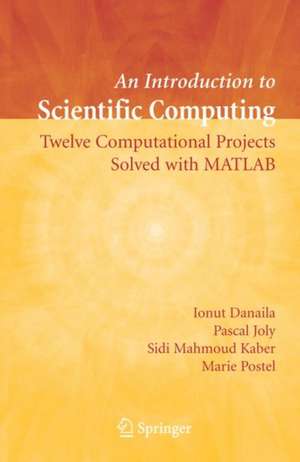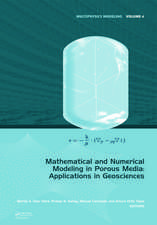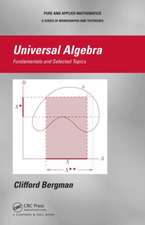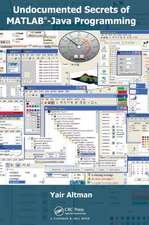An Introduction to Scientific Computing: Twelve Computational Projects Solved with MATLAB
Autor Ionut Danaila, Pascal Joly, Sidi Mahmoud Kaber, Marie Postelen Limba Engleză Hardback – 27 noi 2006
| Toate formatele și edițiile | Preț | Express |
|---|---|---|
| Hardback (2) | 394.71 lei 6-8 săpt. | |
| Springer International Publishing – 8 noi 2023 | 503.74 lei 3-5 săpt. | |
| Springer – 27 noi 2006 | 394.71 lei 6-8 săpt. |
Preț: 394.71 lei
Nou
Puncte Express: 592
Preț estimativ în valută:
75.53€ • 80.77$ • 62.97£
75.53€ • 80.77$ • 62.97£
Carte tipărită la comandă
Livrare economică 18 aprilie-02 mai
Preluare comenzi: 021 569.72.76
Specificații
ISBN-13: 9780387308890
ISBN-10: 038730889X
Pagini: 294
Ilustrații: XVI, 294 p. 135 illus.
Dimensiuni: 155 x 235 x 20 mm
Greutate: 0.57 kg
Ediția:2007
Editura: Springer
Colecția Springer
Locul publicării:New York, NY, United States
ISBN-10: 038730889X
Pagini: 294
Ilustrații: XVI, 294 p. 135 illus.
Dimensiuni: 155 x 235 x 20 mm
Greutate: 0.57 kg
Ediția:2007
Editura: Springer
Colecția Springer
Locul publicării:New York, NY, United States
Public țintă
GraduateCuprins
Numerical Approximation of Model Partial Differential Equations.- Nonlinear Differential Equations: Application to Chemical Kinetics.- Polynomial Approximation.- Solving an Advection-Diffusion Equation by a Finite Element Method.- Solving a Differential Equation by a Spectral Method.- Signal Processing: Multiresolution Analysis.- Elasticity: Elastic Deformation of a Thin Plate.- Domain Decomposition Using a Schwarz Method.- Geometrical Design: Bézier Curves and Surfaces.- Gas Dynamics: The Riemann Problem and Discontinuous Solutions: Application to the Shock Tube Problem.- Thermal Engineering: Optimization of an Industrial Furnace.- Fluid Dynamics: Solving the Two-Dimensional Navier-Stokes Equations.
Recenzii
From the reviews:
"In An Introduction to Scientific Computing, the authors present approaches to the numerical solution of problems drawn from a variety of applications. … This is a graduate-level introduction and the pace is brisk. … This is a strong text on scientific computing for advanced students in applied mathematics. … the book is most appropriate for students with some prior experience in scientific computing … ." (William J. Satzer, MathDL, February, 2007)
"The book is based on material offered by the authors at Universite Pierre et Marie Curie (Paris, France) and different engineering schools. It is intended as a graduate-level text in applied mathematics, but it may also be used by students in engineering or physical sciences. It may also be used as a reference for researchers and practicing engineers. Since different possible levels of each project are suggested, the text can be used to propose assignments at different graduate levels." (I. N. Katz, Zentralblatt MATH, Vol. 1119 (21), 2007)
"An Introduction to Scientific Computing plunges into solving PDEs by numerical approximation. … the book is an attempt to completely discuss numerical issues for reasonably complex problems at the level of a graduate textbook. A project-based approach is used. … Overall, this is a pleasing and useful companion to more complete expositions of the topic. … If you’re preparing advanced students for a workshop, or organizing a numerical analysis club for the semester, then the book is perfect." (Sorin Mitran, SIAM Review, Vol. 50 (1), 2008)
"In An Introduction to Scientific Computing, the authors present approaches to the numerical solution of problems drawn from a variety of applications. … This is a graduate-level introduction and the pace is brisk. … This is a strong text on scientific computing for advanced students in applied mathematics. … the book is most appropriate for students with some prior experience in scientific computing … ." (William J. Satzer, MathDL, February, 2007)
"The book is based on material offered by the authors at Universite Pierre et Marie Curie (Paris, France) and different engineering schools. It is intended as a graduate-level text in applied mathematics, but it may also be used by students in engineering or physical sciences. It may also be used as a reference for researchers and practicing engineers. Since different possible levels of each project are suggested, the text can be used to propose assignments at different graduate levels." (I. N. Katz, Zentralblatt MATH, Vol. 1119 (21), 2007)
"An Introduction to Scientific Computing plunges into solving PDEs by numerical approximation. … the book is an attempt to completely discuss numerical issues for reasonably complex problems at the level of a graduate textbook. A project-based approach is used. … Overall, this is a pleasing and useful companion to more complete expositions of the topic. … If you’re preparing advanced students for a workshop, or organizing a numerical analysis club for the semester, then the book is perfect." (Sorin Mitran, SIAM Review, Vol. 50 (1), 2008)
Textul de pe ultima copertă
This book provides twelve computational projects aimed at numerically solving problems from a broad range of applications including Fluid Mechanics, Chemistry, Elasticity, Thermal Science, Computer Aided Design, Signal and Image Processing. For each project the reader is guided through the typical steps of scientific computing from physical and mathematical description of the problem, to numerical formulation and programming and finally to critical discussion of numerical results. Considerable emphasis is placed on practical issues of computational methods. The last section of each project contains the solutions to all proposed exercises and guides the reader in using the MATLAB scripts. The mathematical framework provides a basic foundation in the subject of numerical analysis of partial differential equations and main discretization techniques, such as finite differences, finite elements, spectral methods and wavelets).
The book is primarily intended as a graduate-level text in applied mathematics, but it may also be used by students in engineering or physical sciences. It will also be a useful reference for researchers and practicing engineers.
The book is primarily intended as a graduate-level text in applied mathematics, but it may also be used by students in engineering or physical sciences. It will also be a useful reference for researchers and practicing engineers.
Caracteristici
MATLAB computer programs for each application-project are made available from the Web site of the Editor Versions using the share-ware language Scilab are provided Complementary bibliography is provided with each project Web page for the book: http://www.ann.jussieu.fr/AI2SC provides an introduction to the book, a chapter content and for each chapter compressed archives containing the MATLAB solutions Chapter summaries, detailed illustrations, and study guides at the end of sections included Exericeses and selected solutions provided Includes supplementary material: sn.pub/extras
Notă biografică
Ionut Danaila is Professor of Applied Mathematics at the University of Rouen Normandy, Laboratoire de mathématiques Raphaël Salem, and former member of Laboratoire Jacques-Louis Lions, Sorbonne Université. He is co-author of two textbooks (in French) on scientific computing and one research monograph (on vortex ring models) for researchers and graduate students. His main research interests are in numerical analysis and modern scientific computing. He developed several numerical codes for applications in fluid mechanics, quantum physics and thermal sciences. Over the last decade, he headed two fundamental research projects on the mathematical modelling and high-performance simulation of quantum systems (Bose-Einstein condensates and superfluid helium).
Pascal Joly, now retired, was Research Scientist at Laboratoire Jacques-Louis Lions, Sorbonne Université and Centre national de la recherche scientifique (CNRS). His main research interests concern efficient algorithms in scientific computing (such as solving large sparse linear systems of equations), coding finite element methods for various industrial applications and exploring the wavelets theory in signal processing. He taught courses on numerical methods in various engineering schools and he is former deputy director of the Master of Sciences and Technology of the Université Pierre et Marie Curie for applied Mathematics.
Sidi-Mahmoud Kaber is Associate Professor of Applied Mathematics at Laboratoire Jacques-Louis Lions, Sorbonne Université. He is co-author of three textbooks in French and one in English on numerical analysis. His main research interests include approximation of singular functions and numerical schemes for parallel computing. He is very engaged in using programming and software in mathematics education.
Marie Postel is Associate Professor of Applied Mathematics at Laboratoire Jacques-Louis Lions, Sorbonne Université. She is co-author of two textbooks (in French) on numerical methods. Her research interests are currently mathematical modeling of biological systems, along with the numerical simulation and calibration of model using experimental data. She has designed several adaptive methods in scientific computing for PDEs using multiresolution analysis. She is currently the head of a master program in engineering mathematics, and teaches numerical methods for ODEs, PDEs and optimization at undergraduate and graduate level.
Pascal Joly, now retired, was Research Scientist at Laboratoire Jacques-Louis Lions, Sorbonne Université and Centre national de la recherche scientifique (CNRS). His main research interests concern efficient algorithms in scientific computing (such as solving large sparse linear systems of equations), coding finite element methods for various industrial applications and exploring the wavelets theory in signal processing. He taught courses on numerical methods in various engineering schools and he is former deputy director of the Master of Sciences and Technology of the Université Pierre et Marie Curie for applied Mathematics.
Sidi-Mahmoud Kaber is Associate Professor of Applied Mathematics at Laboratoire Jacques-Louis Lions, Sorbonne Université. He is co-author of three textbooks in French and one in English on numerical analysis. His main research interests include approximation of singular functions and numerical schemes for parallel computing. He is very engaged in using programming and software in mathematics education.
Marie Postel is Associate Professor of Applied Mathematics at Laboratoire Jacques-Louis Lions, Sorbonne Université. She is co-author of two textbooks (in French) on numerical methods. Her research interests are currently mathematical modeling of biological systems, along with the numerical simulation and calibration of model using experimental data. She has designed several adaptive methods in scientific computing for PDEs using multiresolution analysis. She is currently the head of a master program in engineering mathematics, and teaches numerical methods for ODEs, PDEs and optimization at undergraduate and graduate level.












